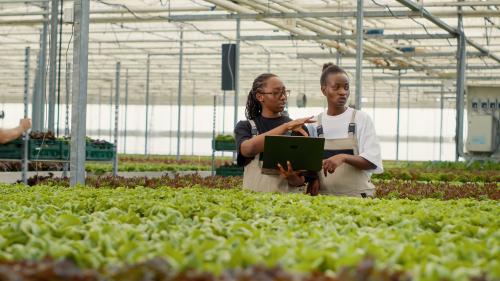This viewpoint is part of Foresight Africa 2024.
Tapping Africa’s entrepreneurial potential is an enormous opportunity. Doing so requires building an enabling environment that can harness investment, nurture local talent, and enable market access.
In recent years, Africa has emerged as a hub for high-growth entrepreneurship. Since 2019, seven tech unicorns have come out of the continent, including from Nigeria, Senegal, Ghana, and Egypt. With a large regional market of over 1.4 billion people and local market inefficiencies that are ripe for entrepreneurial solutions, it is no wonder that Africa is on the startup map.
But we know that it is not enough to have a hub. These hubs need to nurture entrepreneurial scaling to realize the economic, innovation, and job growth benefits of entrepreneurship. And doing so requires venture capital, market access, and talent. Getting these resources is not easy. For example, investors will hesitate to deploy capital if their investments are at risk in countries that have low public trust and high governance issues. Successfully navigating regional markets requires the right expertise to address cross-border challenges. Cultivating and nurturing digital talent is contingent on robust educational programs. For this reason, strengthening institutions and building the capacity of local entrepreneurs and investors are critical to unleash the full potential of Africa’s entrepreneurial ecosystem.
Strengthening institutions
Building and strengthening institutions is critical to shifting the mindset of policymakers to embrace entrepreneurship while reducing barriers for entrepreneurs to grow their startups and investors to fuel that growth. And they require champions to truly make an impact, whether it be new offices dedicated to the digital economy, such as the Digital Transformation Office in the Ministry of Agriculture in Kenya, or an existing office, for example, under the Ministry of Economy.
To cut the red tape for entrepreneurs to start and grow their businesses, regulatory reforms may simplify intricate business registration procedures. They can direct the creation of innovation hubs—as is being considered in Ghana— to make it easier for startups to reach key stakeholders in their ecosystem, whether it be corporate customers, suppliers, or talent. Further, encouraging entrepreneurship education at schools and universities can contribute to a new generation of entrepreneurs.
To encourage investment, governments can offer tax incentives, such as breaks for angel investors and tax holidays for startups. They can also establish funding vehicles to stimulate the investor ecosystem more directly. For example, through establishing venture capital funds of funds and startup loan guarantees.
Building local entrepreneurial and investor capacity
Nonetheless, institutions alone are not enough. The capacity of entrepreneurs and investors dictates whether current or potential entrepreneurs can pursue and grow technological and market opportunities even in seamless institutional environments. Silicon Valley, with decades of experience in starting and growing companies, has amassed a wealth of knowledge that supports future entrepreneurs. And this knowledge can be particularly valuable for startups in hubs like in Africa that need to make the most of limited resources. But building such knowledge in a homegrown way in Africa takes time and money that might just not be possible. So, what else is possible? Leapfrogging knowledge flows through targeted programs is essential. These include:
- Building entrepreneurial capacity: Targeted educational programs led by international accelerators like MassChallenge, Techstars, and Y Combinator provide entrepreneurs with the expertise to build and grow startups. They choose and help build successful startups that can attract investors. Further, exchange programs like National University of Singapore Overseas College (NOC) enable potential and current entrepreneurs to work in places abroad like Silicon Valley, learn the startup ethos, and come back to apply this knowledge in local entrepreneurial endeavors.
- Building investor capacity: Investors are an important part of a local ecosystem. It is not enough to have investors with people, but those with expertise to provide the added value to startups that is crucial to help them grow. Local investors have a unique knowledge of the local market base that can help entrepreneurs find tailored opportunities and bridge resource gaps that they might otherwise face because of foreign discounting. But this local knowledge needs a generalized counterpart—how to balance finances, find and advance talent, and connect the startups to expand strategically in international markets. Training programs for investors like MEST and TECA create a multiplier effect by co-investing with international investors to foster a powerful learning opportunity.
The combination of entrepreneurial and investor capacity means that startups will have the expertise to kickstart and grow their company while making efficient use of their limited resources with positive spillovers for other firms. For instance, the thriving FinTech ecosystem in Kenya is creating a vibrant digital platform for AgTech offering a variety of solutions to smallholder farmers from the on-farm to the off-farm value chain.
Tapping Africa’s entrepreneurial potential is an enormous opportunity. Doing so requires building an enabling environment that can harness investment, nurture local talent, and enable market access.
The Brookings Institution is committed to quality, independence, and impact.
We are supported by a diverse array of funders. In line with our values and policies, each Brookings publication represents the sole views of its author(s).









Commentary
Nurturing entrepreneurial scaling in Africa
August 15, 2024